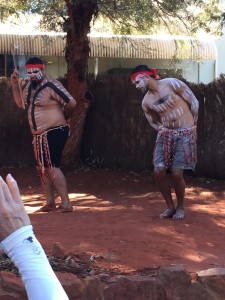Share This Article
For five days I was immersed in the culture of the Anangu who inhabit the Red Center territory of Ayers Rock and Uluru National Park in Australia. Some of the descendants of this thousands and thousands of years old culture now have been trained in the tourist industry and served as my guide to art, music, dance and stories of the Anangu Dreamtime. Everything is about story in this culture, so rather than give facts about the culture, what follows is my story of an Anangu boy fashioned out of what I learned.
First, it is helpful to know the environment into which this centuries old culture was born:
This desert is actually quite lush. There are trees and bushes and grasses. Water is in short supply but there are permanent watering holes and it does rain. The desert is host to a variety of animals, birds, lizards and snakes.
PONGTIBA
In the sacred site of Uluru, Pongtiba was born in the birthing cave 25,000 years ago. As a young boy, he lived with his brothers and sisters in a hut made of dried grasses, although every season the family and his community would have to move to follow the food supply. In his culture, anatomy is destiny. Survival of the species depended upon brute strength, which compared to men, few women have. Because men were stronger did not mean women were regarded as inferior in any way. Women supplemented the hunt and gathered berries, grubs and learned which plants were good to remove warts and ease cold symptoms. They also needed to produce children for the survival of the species. Pongtiba spent his days playing with girls and boys and listening to stories told by his parents or grandparents and in the evenings and on ceremonial days he would watch the community prepare for dances of the Dreamtime. The men would paint their bodies according to the role they would be performing: a hunter or an animal or a bird:
All the children loved the stories because they were funny, even though the themes were very serious. But they also learned from the stories about what is important in life: Country, the earth, is first. It is the duty of man to protect Country for Country is what makes life possible.
Pongtiba learned that Country was made when the Great Father, the Sky fertilized the Mother Earth with water, his sperm, which caused life to begin. Plants, birds, reptiles, animals and humans are linked since they all need the Sky sperm and Earth to initiate life and to grow. In other stories of the Dreamtime he learned right from wrong. For example, greed and lying are wrong; sharing, honesty and protecting the earth are good.
When Pongtiba began to show physical signs of becoming a man, it was time for him to be separated from his sisters, mother and grandmother and to wear clothing for the first time. His clothing was a loin cloth that covered his genitals. As well, he stopped spending his days with his mother and grandparents and entered his educational phase of life by becoming an apprentice to the hunters – his father and uncles and other adult males. Hunting is a bonding experience as well as a protection. Hunters do not hunt alone. They rely on each other in case of animal attack or invasion by an unfriendly group. Also they bear witness for each other.
To become a hunter Pongtiba had to spend 5 years learning anatomy, mathematics, physics, botany and woodworking. The Anangu are a community, not a tribe, so there is no Chief. The community is governed by Elders, men, who have passed the Rite of Initiation, which means they have been judged as having acquired the survival skills of making weapons, hunting, finding water, knowing how to protect Country through conducting domesticated burnings so that new bush can grow, and recognizing every type of dangerous animal and reptile. To pass his final examination for initiation into Elder (for which he is eligible to enter at age 17) Pongtiba would have to know which trees and which bark are suited to make boomerangs or picks to dig for water or spears of various lengths depending upon which animal is being hunted. He had to endure many years mastering word problems like: if I am standing 30 feet away from an approaching emu that is running 60km/hour, what weight boomerang do I use and at what point do I throw it so that I can hit the emu on the head and knock him down? I also have to have a spear of a particular length to go right through the heart so the animal dies instantly. (Anangu belief is that animals must be killed quickly, with no suffering.)
Pongtiba passed his initiation and now that he was an Elder he was a desirable husband. He selected a wife who was very beautiful but not very good at housekeeping and seemed to eat way more food than was necessary. After one year, she was not pregnant even though she had gained so much weight she looked pregnant. Despairing and eager to have a son, Pongtiba found a second wife who was also very beautiful and immediately became pregnant. The first wife became jealous and when Pongtiba came home in the evening with food, the first wife cooked it and ate all of it herself so the second wife, needing food for herself and the fetus became malnourished. Pongtiba was worried about the second wife’s failure to thrive so he started spying on his wives. In Anangu culture, women and men stay out of each other’s business by law. Finally, Pongtiba observed that his first wife was not sharing the food he brought home with his second wife. Upon his discovery, in a rage, Pongtiba hit his first wife over the head with a boomerang and killed her.
The Elders met and decided that Pongtiba needed to be severely punished. That the first wife was wrong to starve the second wife goes without saying, but two wrongs do not make a right. Murder is against the law. Pongtiba was given the worst punishment: banishment to the wild to survive alone for 40 days.
Because he was basically an honorable man and such an accomplished hunter, Pongtiba managed to survive alone and when he returned to the community after serving his punishment for his crime of passion, he was greeted by his second wife and newborn, healthy son. They lived happily ever after.
The moral of this story is that men have to stay out of women’s business and vice versa. That the first wife was mistreating the second wife was not Pongtiba’s situation to correct. Anything having to do with pregnancy and birth is for woman to deal with. Men stay out. This is Anangu law to this day. Pongtiba committed two breaches of Anangu law: murder and messing in women’s business.
The End



